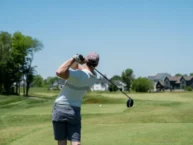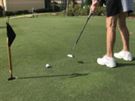It happens to the best of us. You are playing great golf for a couple of weeks, or perhaps months… and you think you’ve finally figured it all out. You’ve honed your long game, practiced your short game, and finally it is all coming together. Your handicap is dropping and you are feeling confident each and every time you tee off.
And then it happens. The slump. Suddenly your game is “off.” You keep slicing the ball into the woods or your putts just will not drop. They circle the cup and sit perched on the edge, never to fall. You broke 80 on the course last week and this week you ended up in the high 90s.
What is going on? To be honest. I haven’t got a clue. This season has been a good one for me. I’ve shaved 4 points off my handicap and have been playing pretty well for me. My teams have won some money at the weekly club outings and I’ve got points to trade in the pro shop. But lately, my game has just been going down hill. I even caught poison ivy when I went too deeply into the brush to retrieve another lost ball. (I’ll be writing about the wisdom of doing that in a later post.)
So what do I do? How do you deal with a slump in your golf game?
The wizards of golf might suggest it’s time to take another lesson from a pro. It’s time to have someone who can be objective, watch you play, and tell you what they see. For some reason your body is not working for you but against you. And you don’t know it. You can’t fix it until you know what it is, and that’s where an objective observer can really help.
One of the women I play with each week is a very good golfer. She can easily hit the ball 200+ yards and has a great short game. But in the last couple of rounds her shots were going all over the place. It took some time and careful attention to what was happening during her swing, but with the help of an observer, she discovered it was that “chicken-wing” thing that was happening on the follow through. She had strained a muscle in her shoulder a few weeks before and now she was unconsciously protecting her shoulder when she swung the club by collapsing her arms instead of letting them stay straight.
My friend was lucky. Her problem was a physical one and was easily corrected once she became conscious of the source. But what if your slump is one that is more of an attitude or mental slump? One bad round of golf sets your teeth on edge and you lose confidence in your ability to play. Once that happens, it’s harder to build that confidence back up.
Attitudinal adjustment is harder, I think, than a physical adjustment. Last week I played nine holes with a guy who had a great attitude. On the first tee he lost his club head! Honest. The head of his driver came flying off as he hit his tee shot. The head went deep in the woods to the left and his ball ended up in the next fairway to the right. Many a golfer would have quit right then and there. But not this one. He told us to keep going. He would find the broken piece of his club and then catch up. And he did. For the rest of the round he used one of his woods to drive the ball and just kept going. And he played pretty well. His attitude kept him smiling.
“You have to remember, it’s only a game. We are here to have fun. Outdoors, in the sunshine, having a good time—sure beats the alternative.”
Jim McLean, one of the top teachers of golf recently wrote a post on Golf Digest online on how to deal with slumps. You can read the entire article here. But here are just a couple of excerpts you might find helpful.
If you’re in a long slump, take a break.
If your handicap has shot up several strokes and you’re confused, obsessed with mechanics, and have more tension than confidence, then you’re in a true slump. Sad to say, it’s time to put the clubs away for a while. Sam Snead would solve a slump by going home and fishing every day, even during the middle of the season.
If you’re shanking, get help now.The shank is the worst of all shots because of the instant and indelible imprint it leaves on your psyche. The fear of doing it again is so great that many golfers can’t diagnose the problem. My advice: Don’t even try to figure it out on your own; see a teacher right away.





I started golfing last summer and immediately I was hooked! My husband ( a long time golfer) and I played every chance we got. I had gotten my handicap from 40+ to 34! Then it all just fell apart! I couldn’t drive, I couldn’t swing an iron…it was terrible! Finally I went to see a pro and had a lesson. He knew right away what I was doing wrong and helped me get back on the right path. I’m doing better now, slowly getting my game back to where I’m loving it again. As a new golfer, I agree with your advice to “get a lesson”. I had a round of 103 the other day and couldn’t be happier!!!
Congrats! on staying with the game and not giving in! This game is definitely one that takes concentration and the ability to perservere. Stay on track. and you will succeed!!!